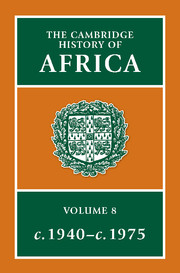Book contents
- Frontmatter
- Introduction
- 1 The Second World War: prelude to decolonisation in Africa
- 2 Decolonisation and the problems of independence
- 3 Pan-Africanism Since 1940
- 4 Social and cultural change
- 5 The economic evolution of developing Africa
- 6 Southern Africa
- 7 English-speaking West Africa
- 8 East and Central Africa
- 9 The Horn of Africa
- 10 Egypt, Libya and the Sudan
- 11 The Maghrib
- 12 French-speaking tropical Africa
- 13 Madagascar
- 14 Zaire, Rwanda and Burundi
- 15 Portuguese-speaking Africa
- Bibliographical essays
- Bibliography
- Index
- References
4 - Social and cultural change
Published online by Cambridge University Press: 28 March 2008
- Frontmatter
- Introduction
- 1 The Second World War: prelude to decolonisation in Africa
- 2 Decolonisation and the problems of independence
- 3 Pan-Africanism Since 1940
- 4 Social and cultural change
- 5 The economic evolution of developing Africa
- 6 Southern Africa
- 7 English-speaking West Africa
- 8 East and Central Africa
- 9 The Horn of Africa
- 10 Egypt, Libya and the Sudan
- 11 The Maghrib
- 12 French-speaking tropical Africa
- 13 Madagascar
- 14 Zaire, Rwanda and Burundi
- 15 Portuguese-speaking Africa
- Bibliographical essays
- Bibliography
- Index
- References
Summary
The history of most African countries since 1940 seems to revolve around a single event: their gaining of political independence. But this climax of nationalism must be set within those social and cultural changes of which it was so much the product and which were, in the main, confirmed in their course for at least a decade or two thereafter. The Second World War boosted a whole variety of social changes: the intensification of cash-crop production, the acceleration of migration of all kinds and the rapid growth of cities, the diversification of the occupational structure and, eventually, the movement of Africans into its upper echelons, and the expansion of modern education at all levels. All these implied changes in areas more immediately constitutive of ‘society’, namely in how people identified themselves and in their patterns of social cooperation and conflict. Now the concept of ‘social change’ is more than a mere umbrella for several parallel, probably somehow-related changes in diverse aspects of social life; it denotes the systematic transformation of a particular society. But at what level do we set ‘society’? The difficulty was that, though the prime source of these changes did not lie within them, it was still much easier, as late as the 1940s, to speak of local social systems like those of Asante or the Luo as being societies than whole colonies like the Gold Coast or Kenya. Thus the pioneering study, G. and M. Wilson's The analysis of social change (1945), took as its units of analysis these small-scale societies, even though the features of change which they described resulted from the progressive incorporation of these societies into wider units, of which the colonial social system was the most important.
- Type
- Chapter
- Information
- The Cambridge History of Africa , pp. 142 - 191Publisher: Cambridge University PressPrint publication year: 1984
References
- 1
- Cited by



